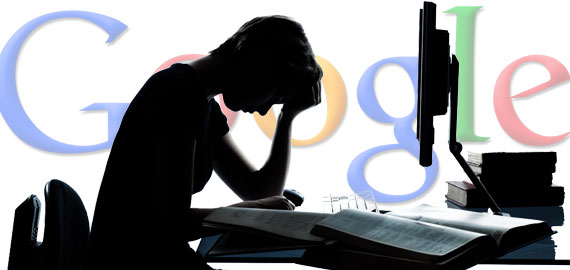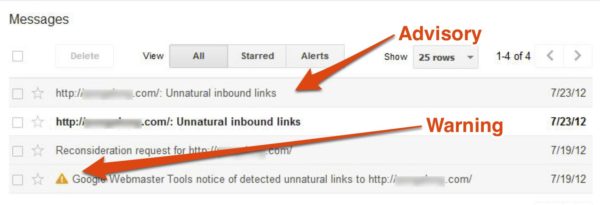Google Updates Link Warnings To (Sort Of) Clarify They Can Be Ignored (Maybe)
Dear Google. Please don’t send out any further link warnings to publishers. Your latest round yesterday, intended to clarify the confusion sparked by ones sent last week, is likely going to make things worse, not better. No more warnings, not until you get some fundamental clarity in place. Dear Publishers. Here’s our latest news on […]
Dear Google. Please don’t send out any further link warnings to publishers. Your latest round yesterday, intended to clarify the confusion sparked by ones sent last week, is likely going to make things worse, not better. No more warnings, not until you get some fundamental clarity in place.
Dear Publishers. Here’s our latest news on the crazy link warnings that have gone out and our best attempt at figuring out whether you should be concerned or not.
How We Got Here
Earlier this year, Google began sending out warnings to some publishers, alerting them that they were involved with “artificial” or “unnatural” linking. Many publishers that received these messages saw ranking drops, especially after Google’s Penguin Update.
Google later said that one way to recover from Penguin was to get bad links removed. It also said that anyone who received a link warning should take action to remove bad links, if they received one of those notices.
Last Week’s Confusion
Last week, Google began sending out a new round of link warnings. These were exactly the same as link warnings that had gone out in prior months, warnings that meant — according to Google — that a site might see a ranking drop if it didn’t act to remove bad links or otherwise report them in some way to Google.
Cue panic.
Cue next the head of Google’s web spam team Matt Cutts, who said not to panic, because the latest round of messages were different. These messages, Cutts explained, were meant to inform some publishers that there were links pointing at their sites that Google might now “distrust” but not something “you automatically need to worry about.”
Unfortunately, there was no way to tell if you got a link warning that you could safely ignore or not.
Cue confusion.
More Warnings, New Wording
Seeing the confusion, Google made a change over the weekend. Cutts commented on our original story, saying:
An engineer worked over the weekend and starting with the messages that we sent out on Sunday, the messages are now different so that you can tell which type of situation you’re in.
We also changed the UI in the webmaster console to remove the yellow caution sign for these newer messages. That reflects the fact that these newer notifications are much more targeted and don’t always require action by the site owner.
Now, if you’re getting what I’d call a “link advisory” from Google, rather than the traditional link warning, it says something like this:
We’ve detected that some of the links pointing to your site are using techniques outside Google’s Webmaster Guidelines. We don’t want to put any trust in links that are artificial or unnatural.
We recommend removing any unnatural links to your site. However, we do realize that some links are outside of your control. As a result, for this specific incident we are taking very targeted action on the unnatural links instead of your site as a whole.
If you are able to remove any of the links, please submit a reconsideration request, including the actions that you took. If you have any questions, please visit our Webmaster Help Forum.
I’ll get back to interpreting this message in a moment. The new messages, the ones that you’re apparently safe to ignore (not that the message makes this clear), appear listed under the “All Messages” area when you log into Google Webmaster Central. They may look like this:
In the screenshot above, “Warning” points at an example of the message that went out last week. Notice the yellow warning sign next to it. Apparently, going forward from this past weekend, link warnings you need to act upon will always have this type of warning sign.
Marked as “Advisory” in the screenshot is an example of the advisory messages that began going out on Sunday. There’s no yellow warning sign, which is designed to reassure publishers that they don’t necessarily have to take action. Maybe.
Can You Ignore The New Advisories?
Maybe? Well, we’re trying to get more clarity from Google on the latest messages. Cutts had suggested that these types of messages were more to inform site owners about distrusted links pointing at them rather than require site owners to take any particular action. But the new advisories still have wording that may cause panic.
After all, the new supposedly-reassuring messages tell people that Google recommends “removing any unnatural links” or to submit a “reconsideration request.” Telling publishers to submit reconsideration requests by its very nature suggests they are getting penalized.
What’s a confused publisher to do? I think if you got one of the messages last week, don’t worry unless you also noticed a recent traffic drop from Google.
If you got one of the new advisories, you’re likely safe to ignore them. However — and now your head will really hurt — that might be a precursor to a future ranking drop that has nothing to do with your site being penalized.
When Links Don’t Get Counted
For years, Google has said that it might not count some of the links it finds on the web as “votes” in favor of a particular web site. The Penguin Update seems to have ramped that up. The messages that are going out also seemed to be tied to this, to better alert publishers that votes they thought they were getting might no longer count.
Think of it as an election, where bogus links are like bogus votes. The ballot box has been stuffed, and those bogus links aren’t being caught. Candidates getting those votes get elected. Then the elections people start looking more closely at the votes and tossing out the bogus ones. Now the candidates that were winning no longer get elected, or elected as often.
Those candidates weren’t penalized. They weren’t barred from being in the election. They just weren’t allowed to benefit from bad votes.
Penalty Or New Way Of Counting Votes?
This is why Google has begun saying that Penguin isn’t a penalty but rather just an algorithmic change, where the algorithm is detecting what it considered bogus votes and not counting them. If you were a site with a lot of bogus votes, then you’re going to be hit harder than sites that have only a few of them among all the legitimate ones.
That’s also why Google hasn’t advised people to do reconsideration requests, if they were hit by Penguin. There was no manual action that could be removed. In other words, Penguin didn’t ban them from being in the election. It just didn’t count bad votes.
Confusingly, however, Google did advise people to clean up bad links. That suggests that Penguin does more than just discount bad votes. It clearly must somehow penalize sites that seem to have a lot of bad links. Otherwise, there would be no reason to advise removing bad links.
So Why Send Messages?
That leads back to why the latest round of messages may be going out. If Google is automatically counting bad links as a way to penalize sites, rather than just discounting them, then any site is potentially vulnerable to “negative SEO,” where someone might point bad links at a competitor.
Google has continued to discount the threat of negative SEO. SEOmoz just covered how an overt negative SEO attack hasn’t impacted its traffic. But the new advisories might be a poorly-implemented way of reassuring publishers about not to worry about negative SEO. They seem designed to give a heads-up that a site might not benefit from some links in the way it did before, not because the site faces a penalty but because the links aren’t counted.
Potentially, that’s helpful. It’s good advice for a publisher to understand they might not be ranking well because the link counting methodology has changed, not because they’ve done something wrong or because of some negative SEO attempt.
However, it’s bad advice not to be clearer, to be suggesting that publishers should be trying to actively remove links pointing at their site, if these links supposedly aren’t trusted. It’s worse to be telling them to file reconsideration requests if they’ve done nothing warranting reconsideration.
If Google wants to keep discounting an increasing number of links out there, that’s Google’s right. But publishers have better things to do than being dragged in as part of that ballot box policing, if they’ve done nothing wrong.
Postscript: See also my column in Marketing Land, Links: The Broken “Ballot Box” Used By Google & Bing.
Postscript 2: See the latest from Google, Google Explains New Link Warnings, Says Don’t Panic But Don’t Ignore.
Related Articles
- Google Sending Warnings About “Artificial” Or “Unnatural” Links
- Google Launches “Penguin Update” Targeting Webspam In Search Results
- Two Weeks In, Google Talks Penguin Update, Ways To Recover & Negative SEO
- SMX Advanced 2012: Matt Cutts On Google Webmaster Tools Warnings
- Google’s New Stance On Negative SEO: “Works Hard To Prevent” It
- Insanity: Google Sends New Link Warnings, Then Says You Can Ignore Them
Contributing authors are invited to create content for Search Engine Land and are chosen for their expertise and contribution to the search community. Our contributors work under the oversight of the editorial staff and contributions are checked for quality and relevance to our readers. The opinions they express are their own.
Related stories
New on Search Engine Land

